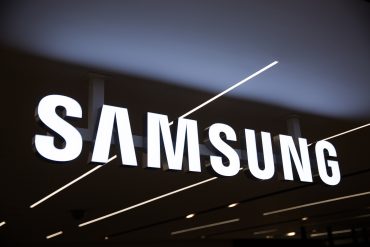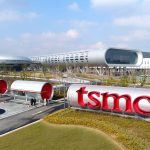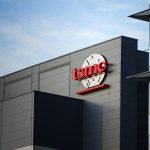
- Investing
- Semiconductors
Samsung Wins $16.5B Tesla Chip Deal, Challenges TSMC Lead
6 minute read

Samsung’s semiconductor manufacturing deal strengthens competitive position against TSMC while securing long-term foundry revenue
Key Takeaways
- $16.5 billion chip manufacturing deal secured – Samsung Electronics signs massive contract with undisclosed global client, representing 7.6% of the company’s 2024 annual revenue and spanning through December 2033.
- Shares surge 3.5% in Seoul – Stock price jumps to largest intraday gain in nearly four weeks following the announcement, reflecting investor optimism about Samsung’s foundry business prospects.
- Strategic win against TSMC dominance – Deal provides critical boost for Samsung’s contract manufacturing division, which holds just 7.7% market share compared to TSMC’s commanding 67.6% position in foundry services.
Introduction
Samsung Electronics secures a pivotal $16.5 billion chip manufacturing contract that sends its shares climbing and signals renewed confidence in the South Korean tech giant’s foundry capabilities. The deal with an undisclosed major global company represents the largest contract win for Samsung’s struggling semiconductor manufacturing division in recent years.
The agreement, finalized on Saturday and announced Monday, provides Samsung with revenue visibility through 2033 while addressing investor concerns about the company’s ability to compete against dominant rival TSMC. Samsung’s stock responded immediately, gaining 3.5% in Seoul trading to mark its strongest intraday performance in nearly four weeks.
Key Developments
Samsung announced the 22.8 trillion won contract through a regulatory filing, though the company declined to identify the client or provide specific terms. The deal spans from July 2025 through December 2033, with Samsung stating that contract details will remain confidential until completion.
The timing proves significant as Samsung faces mounting pressure in the artificial intelligence chip race. The company has struggled to attract major clients like Apple and Nvidia, who have predominantly favored TSMC for advanced semiconductor manufacturing needs.
According to Bloomberg, Samsung described the client as a prominent international company but provided no additional identification details. The contract represents a strategic victory for Samsung’s foundry business, which has faced technological and competitive challenges in recent quarters.
Market Impact
Samsung’s shares closed up 3.5% following the announcement, delivering the strongest single-day performance since late June. The stock movement reflects investor relief over Samsung’s ability to secure large-scale foundry contracts amid intensifying competition.
The broader semiconductor sector responded positively to the news, with analysts viewing the deal as confirmation of recovering demand in contract chip manufacturing. Samsung’s foundry division has historically lagged behind TSMC, holding just 7.7% of the global foundry market compared to TSMC’s 67.6% share in the first quarter.
The contract’s scale provides Samsung with approximately 7.6% of its annual revenue locked in over eight years, offering financial stability during a period of market volatility. Samsung’s second-quarter operating profit declined 55.94% year-over-year to 4.6 trillion won, making the revenue certainty particularly valuable.
Strategic Insights
The deal addresses Samsung’s urgent need to diversify its foundry customer base and reduce dependence on memory chip revenues. Samsung has struggled to match TSMC’s technological leadership in advanced manufacturing nodes, particularly the 2-nanometer and 4-nanometer processes crucial for AI applications.
Industry analysts suggest the contract likely involves advanced semiconductor manufacturing for AI and data center applications, aligning with explosive demand in generative AI markets. The AI chip market is projected to grow from $125 billion in 2024 to $150 billion in 2025, creating opportunities for foundry providers.
The agreement also supports Samsung’s broader geographic diversification strategy, potentially impacting production plans for the company’s delayed Texas manufacturing facility. Samsung has faced challenges securing major customers for its U.S. operations, making this contract particularly significant for international expansion efforts.
Expert Opinions and Data
Lee Min-hee, an analyst at BNK Investment & Securities, noted that the contract is unlikely to involve Samsung’s most cutting-edge technology like 2-nanometer manufacturing due to current production yield challenges. This assessment reflects ongoing concerns about Samsung’s ability to match TSMC’s technological execution.
Industry experts regard the deal as a critical stabilizing force for Samsung’s foundry operations. The contract provides much-needed revenue visibility while signaling that major global companies are regaining confidence in Samsung’s manufacturing capabilities despite technological gaps with TSMC.
Samsung currently holds 10.6% of the global semiconductor market, maintaining its position as the world’s largest memory chip manufacturer. However, the company’s foundry market share remains significantly behind TSMC, highlighting the strategic importance of securing major manufacturing contracts.
Conclusion
Samsung’s $16.5 billion manufacturing deal represents a significant milestone for the company’s foundry ambitions and provides crucial revenue stability through 2033. The contract demonstrates Samsung’s ability to compete for large-scale manufacturing agreements despite technological challenges in advanced semiconductor production.
The deal strengthens Samsung’s position in the evolving semiconductor landscape, where AI-driven demand creates new opportunities for contract manufacturers. While Samsung continues to trail TSMC in market share and technological leadership, this contract provides a foundation for rebuilding investor confidence and securing future growth in the foundry sector.








